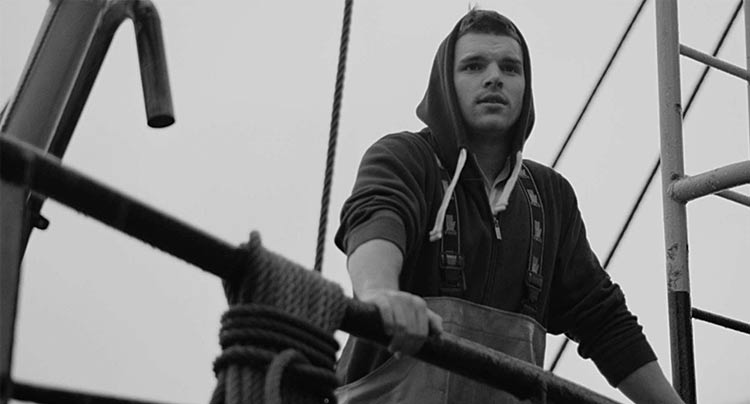
Nice light-hearted touches offset the somber material of the remote Dutch fishing community of Urk.

Nice light-hearted touches offset the somber material of the remote Dutch fishing community of Urk.
Directors Lonnie van Brummelen & Siebren de Haan profile the small, unique town of Urk in Episode of the Sea, a playful documentary premiering in the Wavelengths programme at TIFF this year. Urk used to be an island in the Netherlands until the government drained the surrounding waters as a way to increase farmland. Attempts to get citizens of Urk (an area known for its unique dialect and wariness of outsiders) to switch from fishing to agriculture failed, as fishermen simply traveled further to work at sea. Fishermen from Urk ended up earning paychecks as high as government officials, something people in the surrounding area refer to as “the miracle of Urk.”
Van Brummelen and de Haan directly address viewers through several long blocks of scrolling text explaining the town’s history while touching on some of their film’s themes. Shooting in black and white on 35mm stock, Episode of the Sea is gorgeous to look at, each frame’s deep focus providing one stunning image after another. The cinematography also reflects the subject; just as Urk’s workers in the fishing industry lament their old, traditional methods of work as they fade into irrelevance, the screen’s curved edges and Academy ratio act as a reminder of the once normal, now archaic practice of shooting on celluloid.
The parallel van Brummelen and de Haan draw between their profession and their subjects’ provides a fascinating backbone for the film. As they begin filming fishermen at work, the filmmakers mention how their own work methods began mirroring their subjects’, possibly as a result of their mutual ostracization from society. Early on, one of the on-screen texts explains how the relationship between the two groups started: with government cuts making people in the arts look like freeloaders, and fishermen considered pirates draining the sea, they agreed that both professions suffer from “an image problem.” This frames the filming process as a sort of mutual exchange between observer and observed.

The other side of this exchange becomes Episode of the Sea’s boldest, and best, quality. Using transcripts of conversations overheard during their research, van Brummelen and de Haan recruited residents of Urk to participate in staged scenes re-enacting these exchanges. Emphasis on the word staged here, as “actors” awkwardly recite their lines while positioned in deliberate poses. The stilted, unnatural quality of these scenes, reminiscent of Aki Kaurismäki’s work, are just plain funny at times, a nice light-hearted touch to offset some of the more somber material (one exchange has several fishermen wondering what to do now that they’ve decommissioned their ships).
But just like van Brummelen and de Haan adopted the fishermen’s ways, the townspeople soon become savvy to the methods of filmmaking. As the filmmakers note in one of the pieces of scrolling text, the townspeople began to take over directing duties, coaching each other on how to best deliver lines and disagreeing with some of the directors’ choices. Staged scenes soon take on a looser quality, with townspeople putting more confidence in their delivery or simply doing more than just standing in one spot. It’s a delightful development, one that goes perfectly with the parallels van Brummelen and de Haan frequently highlight throughout (it should be mentioned that “the inhabitants of Urk” also receive a directing credit, a choice making perfect sense by the end). It’s what distinguishes Episode of the Sea as something more than an ethnographic study of a unique community. Rather than stand aside and try to detach themselves, van Brummelen and de Haan embed their involvement into the film’s fabric through clever, enjoyable means, elevating Episode of the Sea into a rich viewing experience.